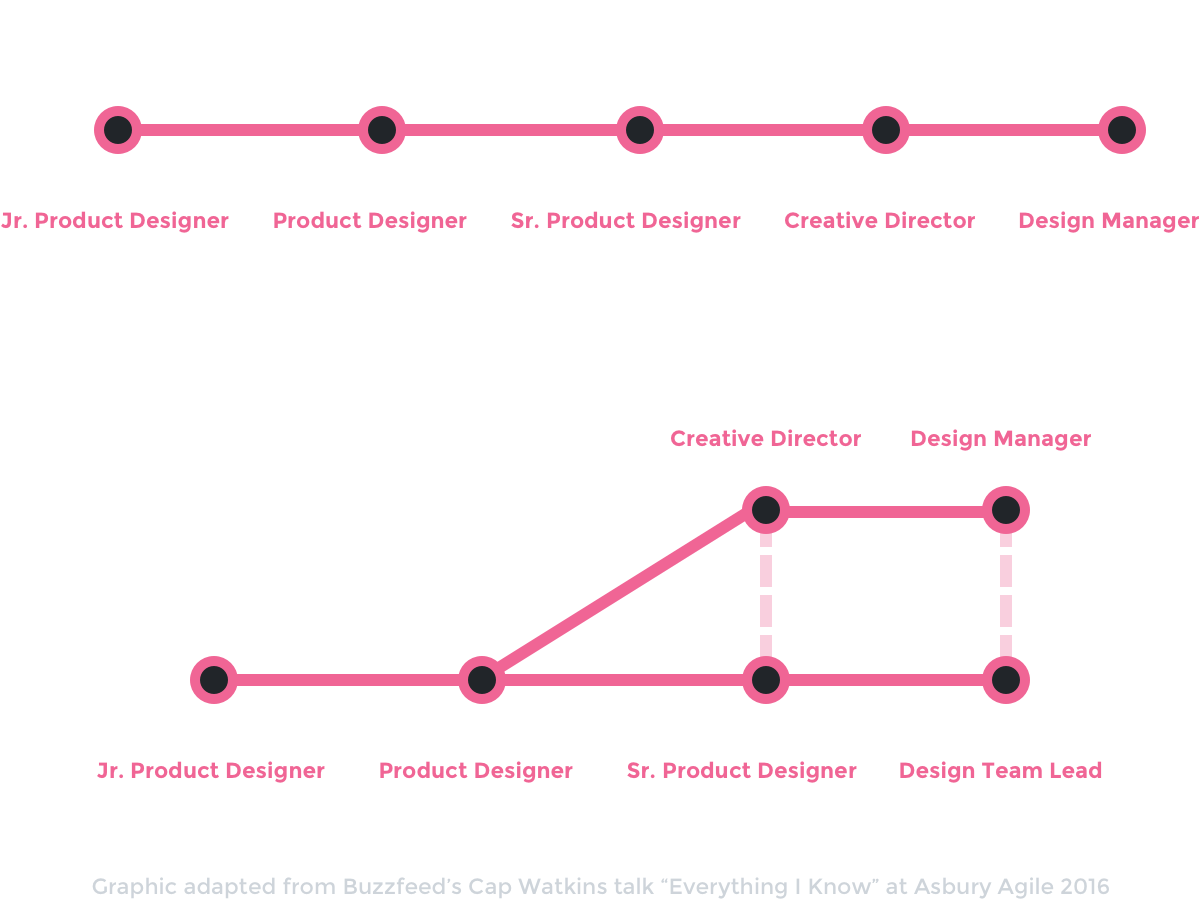
Silent Leadership
I have a confession: I’ve been a designer for over 15 years and I still don’t know what I want to do with my life. I love design+code and want to keep improving, but don’t know what the next step in my career should be.
In tech, advancing one’s career doesn't have to mean following a “traditional” path of giving up one’s craft and moving into management. It’s perfectly acceptable to focus on improving the work itself and developing a solid design career as an individual contributor (IC for short). But at the same time, I can’t help but notice how some folks I’ve known for a while have transitioned from IC roles to managerial roles. I ask myself:
- How did they end up in that role?
- Did they work towards it? Or did it happen circumstantially?
- Is the natural path to become a manager?
- Is that what I should strive for?
As I try to decide what job title I should be working towards, I’ve talked with a number of designers and design managers about their career paths. I began to notice a theme start to emerge.
Silent Leadership
If you’re looking to grow as a leader, don’t wait for someone to promote you into that position. Uncover the areas where you can lead and just start doing it.
I first heard the term “Silent Leadership” from Fabio Carneiro in a Slack conversation. The idea is to show that you have some of the requisite skills of a leader without having the title. Act as a unifier by facilitating communication between people, for example. Or act as an ad hoc project manager by taking care of the all the ancillary stuff around projects to allow others to focus on designing. Become the person who people come to for advice, or to vent. Run the meetings when the creative director is out sick. Push the team to explore other design solutions when they’ve tunneled in on only one. Pull the person who got yelled at in the meeting aside and explain why it happened. Mentor the new hire. Be an ambassador for non-designers. Become a subject matter expert through writing or giving talks (be it at a conference or within your team). Put the term “thought leader” in your bio. Ok, maybe not that last one.
The idea is to focus on more than just design. Don’t just be a good designer, be a good co-worker and professional. You don’t earn a leadership position with your headphones on. If you’re already doing the job of a design leader, it’s your best way in.
Want to be well-known in your industry? Help as many people as you can.
— Justin Jackson (@mijustin) February 26, 2017
Having a good reputation opens all kinds of doors.
Work for a Company that Looks for Silent Leadership
But doing this is only part of the battle. You also have to be working for a company that has its eyes open for silent leadership. Cap Watkins talked about how Buzzfeed thinks about the career path of its designers at Asbury Agile 2016 (graphic below). Buffer, Basecamp, and Facebook have all written about career advancement options for their staff. They all include career paths that don’t involve management.

I particularly like how Buffer explains its framework:
All of our frameworks focus on two things:
- The scope of influence that a person has on their work, their team, the company, and the industry
- The ownership that they have over their area
This shows a clear path of advancement without needing direct reports in the org chart.
Not all companies recognize and reward silent leadership, though. My last employer didn’t and I eventually resigned because of it.
Making a Career
When I joined Stack Overflow as a senior product designer, one of the things I immediately appreciated was how the company emphasizes career development and personal growth. At Stack Overflow, designers don’t just design. Strong leadership from individual contributors plays a big role in steering product development at the company.
I’m not quite ready to take over my boss’s job and detach myself from design work entirely, but I do take every opportunity to develop my silent leadership skills. That way, when I finally figure out what I want to do with my life, I should have a few good options.
Do you have similar thoughts? At a crossroads in your career? Recently been through a transition or promotion? I’d love to hear your story here or on Twitter.
Also published on Medium
